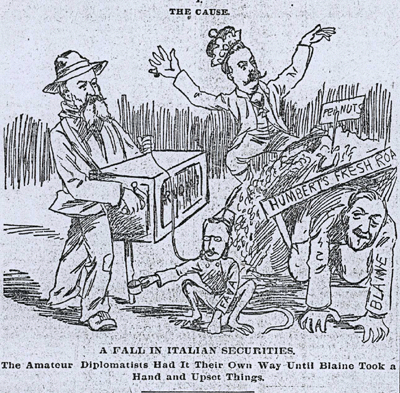Random Thoughts on an Italian Elected Official’s “joke of passing fancy” on a Sunday Afternoon
I wrote the following while in the midst of teaching a three-week course on “Italian” literature in America. During this period, we are also reading what both the Americans and the Italians wrote about those Italians who came during the great wave of immigration, 1880-1924.
What follows convinces me even further that Italy, that geo-political zone of the peninsula and two large islands, is in dire need of studying its diasporic history in order to understand, once and for all, how those who had to leave Italy were treated by the so-called, but not behaving as such, host countries. With that as a background, it is indeed most difficult — nauseating might be a better term — to read Roberto Calderoli’s remarks about Italy’s Minister for Integration, Cécile Kyenge.
The following quote comes from the online version of Corriere della Sera:
Roberto Calderoli, vicepresidente del Senato ed ex titolare del ministero per la Semplificazione. «Fa bene a fare il ministro, ma forse lo dovrebbe fare nel suo Paese. È anche lei a far sognare l’America a tanti clandestini che arrivano qui» dice dal palco della festa del partito a Treviglio.
Roberto Calderoli, vice president of the Senate and former Minister for the Administrative Simplification. "It's good for her to be a minister, but maybe she should better be a minister in her own country. It is also her responsibility if so many illegal immigrants come to Italy dreaming of America" he says from the stage the feast of his party (the Northern League) in Treviglio.
And then he continued:
«Io mi consolo — tuona Calderoli davanti a circa 1.500 persone — quando navigo in Internet e vedo le fotografie del governo. Amo gli animali, orsi e lupi com’è noto, ma quando vedo le immagini della Kyenge non posso non pensare, anche se non dico che lo sia, alle sembianze di orango».
"I console myself - Calderoli thunders in front of about 1,500 people - when I surf the Internet and see photographs of the government. I love animals, bears and wolves, as is well known, but when I see pictures of Kyenge I cannot avoid thinking of the appearance of an orangutan - even though I am not saying that she is one."
And so it goes… From Italy we have here yet another incident that is simply, and only as such, embarrassing; I see no excuse at all for such musings, unless, of course, one inhabits that world dedicated to “Whiteness” at all costs. Such a statement from Calderoli underscores a racism that is obviously so ingrained in certain Italians that they feel absolutely no shame is making such statements. Later, in fact, he stated the following to Radio Capital:
«Ma, è stata una battuta, una battuta in termini della simpatia,… niente particolarmente contro, era proprio legata alle mie impressioni…»
"But, it was a joke, a joke in terms of sympathy ... nothing particularly against ... it was linked to my impressions ..."
He insisted, as is apparent for his statement, that he did not compare her to an orangutan. Yet, even our advanced students in Italian 101 would understand that the phrase “non posso non pensare … alle sembianze di orango” is a clear comparison to the predicate object. But the shamelessness of Calderoli is second to none. For as is apparent above, he then stated on the radio that it was said “in termini della simpatia”, which, here, can mean either “with congeniality” or in “passing fancy”. Really? Comparing someone to an orangutan can in some context or another be considered to be a statement of congeniality or of passing fancy?
The issue here is twofold. First, we are dealing with the vice-president of Italy’s Senate, one of two parts of its national political body. It is one of two organs that decide the laws and legislations of Italy, which keep in check civil behavior in Italy, as is the case in other democratic countries. That any member of society might speak in this fashion is, and should be to all, unacceptable. That it then comes from someone in office, and in such a high office to boot, is patently unfathomable. What then complicates the matter even more is that he feels absolutely no shame in having said what he did. The brief interview he gave to Radio Capital underscores such a bold-faced thought process that, as is crystal clear, causes him no embarrassment.
The conclusion? It all comes down to skin color and geography. If there are those northerners in Italy (he is, after all, of the Lega Nord) feel comfortable in calling southerners “terroni” (Oh, yeah, let us not forget, as is often said, “Africa comincia da Roma in giù.”) what would stop them from comparing someone from Africa to an orangutan? All of this, if we wish to be generous here, is due to complete ignorance on the part of one human being toward his sisters/brothers who manifest difference if only by their physical attributes. Ignorance of the fact that his own ancestors who left — check that, who were forced to leave — Italy at the turn of the 19th/20th century were treated in similar dehumanizing ways. Indeed, Italy’s prime minister Enrico Letta reminded Italy’s population (including its elected officials) as much this past May, when he read from a 1912 Report on Immigration to the US Congress, a report that was filled with a plethora of insults toward Italian immigrants of that time which are similar to if not identical to what we hear today from individuals in Italy, Calderoli leading the way.
And it is indeed the difference in who speaks that lies here. Shameful and unacceptable that it is, it is one thing to hear such dehumanizing racial epithets from the public. It is totally different to hear it from an elected official, whatever his/her office may be. While they are, on a national scale, “representatives” of certain areas and specific ideologies, they are also, and indeed first and foremost (even though not all act accordingly, as we see here), defenders of the national code of laws and civic behavior. In his role as vice president of the Senate, Calderoli has taken it one step further. Italy and her emigrants and sons, daughters, grandchildren, and great grandchildren deserve a better legacy from the home country!










































i-Italy
Facebook
Google+
This work may not be reproduced, in whole or in part, without prior written permission.
Questo lavoro non può essere riprodotto, in tutto o in parte, senza permesso scritto.